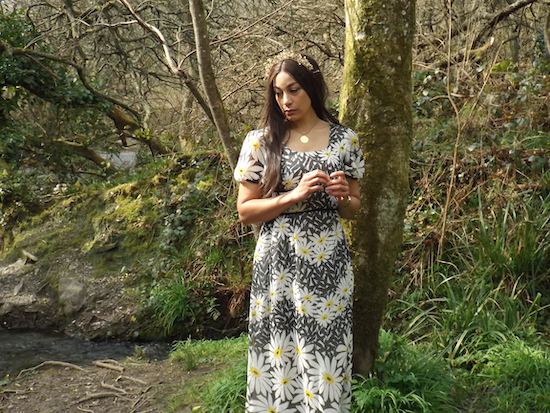Photo by Nick Duffy
When Angeline Morrison was a teenager in Birmingham, she found a place that felt right for her: the folk club. “Fok clubs were so relatively welcoming to people and friendly and warm – you were so encouraged to sing”. She used to go along with her dad, she explains, as there weren’t many young people there. She speaks surrounded by instruments in her house in her long-adopted home county of Cornwall. “But then of course I noticed something else very quickly. There didn’t seem to be many other people there who looked like me.”
Born to a Jamaican mum and Scottish dad, Morrison has just released one of the folk albums of the year. Released on the definitive traditional music label Topic Records, it’s produced by Eliza Carthy, with her folk legend dad Martin helping out on the final track, and it’s got a great, agenda-defining title – The Sorrow Songs: Folk Songs Of Black British Experience.
The album was inspired by Morrison’s desire to fill an absence that she felt deeply when she looked for folk songs to sing. “I never heard songs that seemed to reference Black people in folk clubs, and I never found them either. And people of course used to tell me, well, there weren’t many Black people here in the past, which we know now is far from the truth.”
During pandemic lockdowns, Morrison went online to research specific lives and stories of Black people through the centuries for this record. "And I barely scratched the surface. There were so many more stories I could have told." I ask her why she thinks songs from the past are hard to find, and whether it’s the fault of folk collectors themselves – her answers are always thoughtful and articulate, as belies her previous experience as a lecturer on the subject. “There are many reasons, I think: the selection processes of collectors could be one of them, but also there could be songs by African Americans that don’t reference race directly that are out there already, of course." She wanted to "create the kind of songs I had wanted to sing," and use her skills to open up so many other people’s pasts, "which could then be passed on.”
An album of stark, direct songs that sound like they’ve been found in dusty boxes in The English Folk Dance And Song Society’s HQ, Cecil Sharp House, Sorrow Songs adds welcome breadth and weight to the traditional canon. Its name comes from chapter fourteen of W.E. Dubois’ 1903 book, The Souls Of Black Folk, which Morrison read after the murder of George Floyd in 2020, which emphasised the importance of folk songs to enslaved Africans and their descendants living in the terrifying climate of early 20th century America.
Morrison’s deep, precise voice is affecting throughout, alternately comforting and cautioning. So is her shimmering autoharp playing. The songs are also surrounded by interludes of racist speech taken from old British documentaries and re-recorded. Morrison wanted to echo the form of Ewan MacColl and Charles Parker’s BBC Radio Ballads, recorded from 1957 to 1964, although, she says, with a sigh “I had to calm down a lot of the comments so that the horror of them didn’t distract from everything else”.
The song’s subjects are fascinating, jolting and often upsetting. ‘Unknown African Boy [d. 1830]’ imagines the voice of the mother of an eight-year-old child whose body was washed up on the Isle Of Scilly. Set to up-tempo fairground music, ‘The Beautiful Spotted Black Boy’ tells the story of George Alexander Gratton, a young boy with vitiligo who was paraded at travelling freak shows. We meet little-known 18th century Black horticulturalist John Ystumllyn, who lived in North Wales (‘Black John’), nurse Mary Seacole (‘Cinnamon Water], and second-generation British-Barbadian twins June and Jennifer Gibbons, who spoke in a private language together after being bullied as children, and were sent to Broadmoor in 1981 after setting fire to an abandoned building (‘The Flames They Grow High’).
The album ends with ‘Slave No More’, the story of Evaristo Muchovela, a seven-year-old child sold into slavery. Morrison asked Martin Carthy if he would play the part of a priest reading out the inscription on the boy’s grave in Wendron Churchyard, and he immediately said yes. His voice provides a beautiful
connection between the established British folk canon and a new pioneer broadening British history.
Morrison is also a lifelong record collector and crate-digger across many other genres. She has delved into 60s funk, soul and psych (in a duo, The Mighty Sceptres, and a band, The Ambassadors Of Sorrow); indie-folk (with We Are Muffy, with her musical partner, Nick Duffy from The Lilac Time), and brilliant folk-horror flavoured psychedelia (her 2020 album with Stephen Stannard as Rowan: Morrison, Lost In Seaburgh, is my particular favourite, inspired by the 1970s BBC adaptations of MR James’ ghost stories).
This variety underlines why her Bakers’ Dozen is such a great mix, I tell her, as she shows me the covers of each of her albums on the Zoom call with pride. “Can I sneak Brook Benton in as well?” She laughs and wrinkles her nose. “No. But you’ll see I’ve snuck some extra in anyway…" In that same vein, let’s hope The Sorrow Songs Volume 2 is not too far away.
The Sorrow Songs: Folk Songs Of Black British Experience is out now via Topic. To begin reading Angeline Morrison’s Baker’s Dozen click the image of her below.



